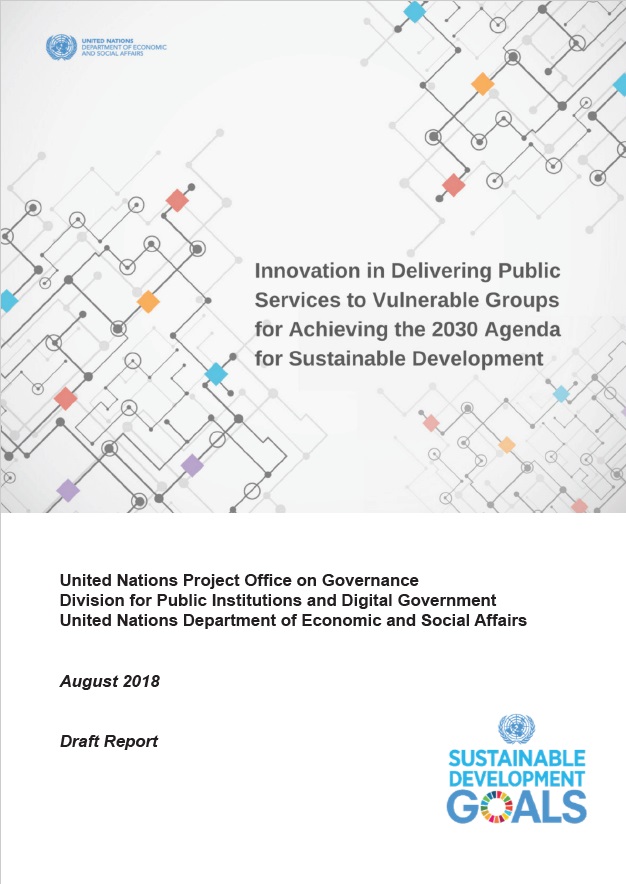The UNPOG Public Governance Quarterly
Innovation in Delivering Public Services to Vulnerable Groups for Achieving the 2030 Agenda for Sustainable Development
Innovation in Delivering Public Services to Vulnerable Groups for Achieving the 2030 Agenda for Sustainable Development

ICT and digital government can provide critical support to governments in delivering public services that better meet special needs of vulnerable groups. Improving public service delivery for vulnerable groups is essential to ensure that no one is left behind, which is the overarching theme of the 2030 Agenda for Sustainable Development. Thus frontier technology offers the opportunity to foster the transformative change required to reach those furthest behind first and to achieve the Sustainable Development Goals (SDGs) by 2030.
Although Member States have recognized the importance of addressing the special needs of vulnerable groups to create inclusive, resilient and sustainable societies, further research is required on the underlying causes and solutions to the vulnerability. Therefore, further research is needed to conduct some comparisons between various definitions of vulnerability by international organizations, outlines the challenges of governments to identify vulnerable groups, and provides potential solutions to help governments address such challenges. Considering the multiple dimensions of vulnerability, and the fact that women and girls face compounded risks even within vulnerable groups, it is crucial that governments and other key stakeholders recognize the complexity of vulnerability in their local contexts and strive to address it. To address the needs of vulnerable groups, it is critical that governments implement monitoring and evaluation processes that take into account vulnerability. Monitoring and evaluation require data collection to ensure customized public services match the special needs of the most vulnerable. Despite varied challenges, such as the lack of capacity of public officials at both the national and sub-national level, oversight mechanisms such as Supreme Audit Institutions and parliaments, as well as accountability tools like Open Government Data (OGD) can help governments ensure that policies and programmes are inclusive.
Innovations in governance provide another means to better understand and address vulnerability. It is important to see how innovation can positively contribute to public service delivery to foster a more inclusive, participatory, and easily accessible governance. Nevertheless, governments must attend to the risks of adopting innovative, and therefore disruptive, technology in addressing the needs of vulnerable groups to ensure that adverse consequences of its application do not exacerbate social inequalities. With this in mind, it is also essential to specifically addresses frontier technology as an important modality to deliver innovative public services for vulnerable groups. Innovative public service cases, by leveraging Big Data, Artificial Intelligence (AI), the Internet of Things (IoT), and blockchain, could help ensure that no one is left behind.
Moving forward, governments shall take actions including instituting an adaptive legal framework to fully exploit benefits of frontier technology for better serving citizens while minimizing the inherent biases against marginalized groups which could be caused by such applications as data analytics and algorithms. Working to ensure that frontier technology leaves no one behind, therefore, requires constant evaluation of whether or not it is inclusive, for whom, and how. What matters most is to take measures, including scrutinizing laws and regulation and making necessary changes, to adapt to the new technology and ensure that frontier technology bridges divides for a more inclusive society rather than widening gaps and leaving the vulnerable groups further left behind. In designing, implementing, and evaluating policies and programmes, governments should therefore be prudential in leveraging ICT and digital government to deliver more inclusive and equitable public services for vulnerable groups to fully address the multidimensional characteristics of vulnerability.
Keping Yao
Governance and Public Administration Expert, UNPOG, DPIDG, UN DESA
PARK Mi Kyoung
Associate Research and Policy Analysis Expert, UNPOG, DPIDG, UN DESA


